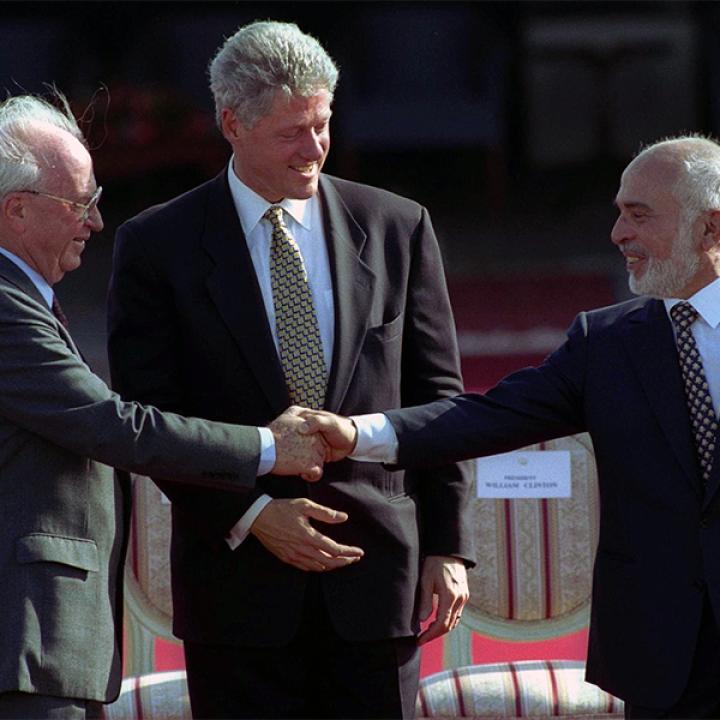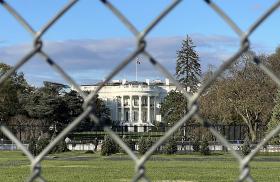

Israel’s former president and Jordan’s former foreign minister discuss the legacy of the peace treaty after three decades, including its relevance to the current regional conflict.
On October 22, The Washington Institute held a virtual Policy Forum with Reuven Rivlin and Jawad al-Anani, moderated by Robert Satloff. Rivlin served two stints as the speaker of Israel’s parliament and was the country’s tenth president. Anani formerly served as chief of the Royal Court, deputy prime minister, and foreign minister of the Hashemite Kingdom of Jordan. Satloff is the Institute’s Segal Executive Director and Howard P. Berkowitz Chair in U.S. Middle East Policy. The following is a rapporteur’s summary of their remarks.
Robert Satloff
It is an understatement to note how challenging the past year has been for Arabs and Israelis alike. Yet, under the heading “it could be worse,” it is important to recognize that some pillars of stability have endured—one of which is the historic peace agreement that Israel and Jordan established thirty years ago, normalizing relations between the two neighbors and affirming a strategic partnership based on common interests. In this regard, we should pause to recall the bravery of those peacemakers who forged this agreement: Jordan’s King Hussein and Israel’s Prime Minister Yitzhak Rabin, who helped their countries overcome a long legacy of conflict to build a peace that has survived for a generation.
To be sure, the treaty has not produced everything that each nation hoped for. Moreover, factions within both countries have begun questioning and even opposing the agreement of late, seeing it as a barrier to their ideologically driven aspirations. Nevertheless, the treaty has endured, providing benefits to Jordanians and Israelis alike while reminding us that peacemakers remain on both sides of the Jordan River, even when louder voices seek to drown them out.
Reuven Rivlin
The peace treaty represents practical cooperation even when opinions may differ on the path to a future settlement of outstanding issues. Jordan and Israel’s 350-kilometer border is effectively open from a security perspective given the small number of troops stationed there, but it has been secure because of the vital cooperation between our two militaries. For Israel, this has been a critical component of securing the “eastern front” against Iran-backed proxies. Israel’s strategic cooperation with Jordan has also benefited Palestinians by increasing access to jobs and water. The two governments have even worked together in Jerusalem—the historic capital of Israel—where the peace treaty affirms the Hashemites’ special status as custodians of Muslim religious sites operating through the Waqf.
Over the past year, the October 7 attack and subsequent events have shown that extremism poses an existential threat to Israel. The country faces a multifront war with threats on all borders, and it must be able to protect itself from those who seek its destruction, including the radical Islamists of Iran, the Islamic State, Hamas, and the Muslim Brotherhood. The past year has also shown that Israel—the homeland of the Jewish people—is here to stay as a sovereign, independent state. The situation echoes the Zionist leadership’s response in 1948 when King Abdullah I, the great-grandfather of the current king, proposed granting Jews autonomy within the larger Hashemite Kingdom. The response then and today is no—our goal remains sovereignty in an independent state.
Regarding the Palestinians, I believe the best solution to this outstanding issue is a lasting peace in which all people living west of the Jordan River are full citizens with full civil rights in the democratic state of Israel. I recognize there are other ideas, from “two states for two peoples” to various forms of confederation. We should sit and negotiate a solution. After all, Arabs and Jews are not “doomed” to live together; rather, we are destined to live together, as we see from thirty years of Jordan-Israel peace.
Jawad al-Anani
Just five years ago, when we met to discuss the twenty-fifth anniversary of the peace treaty, the bilateral relationship was evaluated based on which initiatives materialized and which did not. Now, just five years later, we are asking ourselves whether peace still exists at all.
With war engulfing the region, even countries that are not directly involved are becoming “collateral damage.” There is no clear winner in the current conflict. Evidently, a new, more innovative approach is needed to change the status quo. In order to build a permanent peace, we have to broaden the security-focused mindset that has dominated until now to think more about coexistence, human rights, and common prosperity.
Jordan has been steadfast in its commitment to peace and rejection of extremism. It has resisted calls to end the treaty with Israel and proved its resilience in dealing with extremist elements. It is true that the Muslim Brotherhood won the recent Jordanian election because of popular sympathy for those who are suffering in Gaza. Yet this does not mean that Jordan condones the atrocities of October 7, which it joined other Arab states in condemning soon after the attack. With the influx of refugees that Jordan has experienced from so many conflicts, peace is an existential issue for the kingdom.
Both Israel and Jordan should create the conditions for returning to the bargaining table to achieve a lasting diplomatic solution to the ongoing conflict; perhaps a track-two approach is needed before formal negotiations can begin. But first, we must push for a temporary ceasefire that brings a stop to the fighting and freedom for the hostages, after which a permanent ceasefire can be negotiated. Only once we have addressed the current situation can we make progress on a lasting peace.
This summary was prepared by Elizabeth Surman. The Policy Forum series is made possible through the generosity of the Florence and Robert Kaufman Family.





